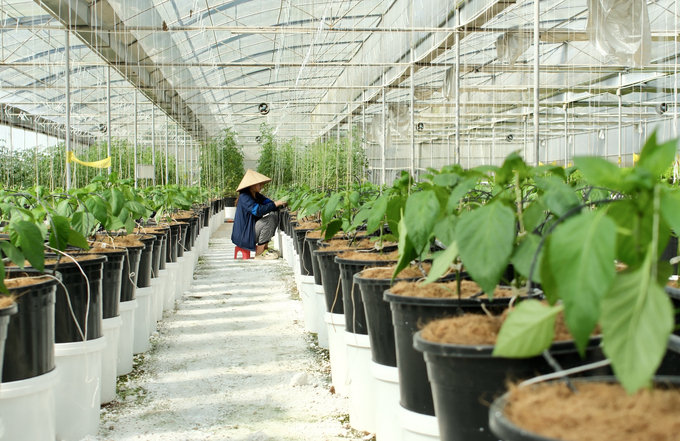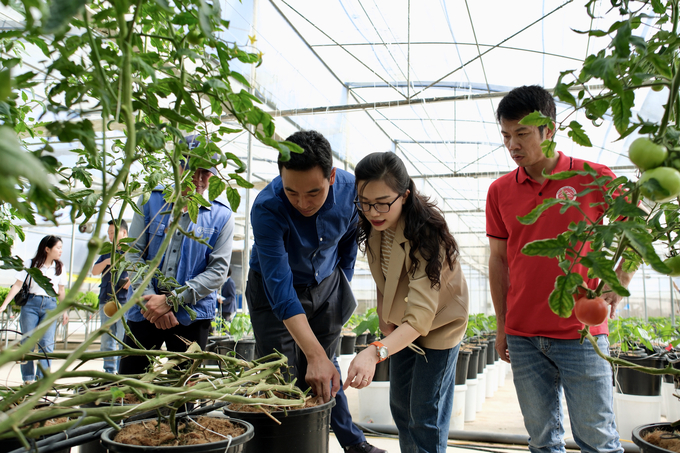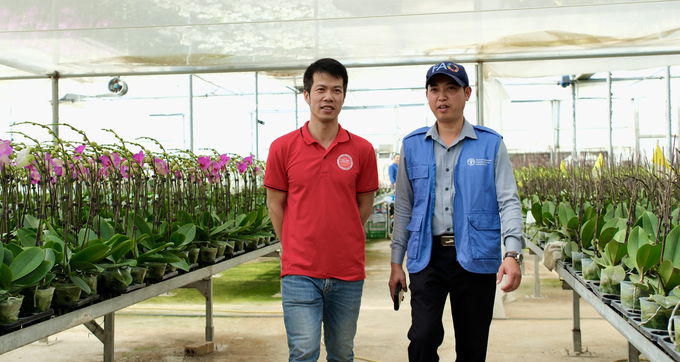May 29, 2025 | 11:17 GMT +7
May 29, 2025 | 11:17 GMT +7
Hotline: 0913.378.918
May 29, 2025 | 11:17 GMT +7
Hotline: 0913.378.918
As part of the agreement signed between the People’s Committee of Son La province and the Fruit and Vegetable Research Institute (FAVRI), the soil-free fruit and vegetable growing model is being piloted in Son La.
This model is part of the “Smart Agriculture for the Future Generation” project, implemented at the Moc Chau Applied Research and Transfer of Science and Technology Advances Zone under the Son La Startup and Innovation Center (Department of Science and Technology of Son La province). The project is funded by the Korean government through the Food and Agriculture Organization (FAO).

The soil-free fruit and vegetable growing pilot model is a component of the "Smart Agriculture for Future Generations" project. Photo: Quynh Chi.
In 2024, the Son La Startup and Innovation Center, in collaboration with FAVRI, will pilot three soil-free growing models (using coconut fiber substrate, hydroponic systems, and irrigation systems) over an area of over 1,600m2 in modern greenhouses. The pilot site is located in the Chieng Di sub-area of Moc Chau Farm town, Moc Chau district.
Mr. Nguyen Anh Dung, Deputy Director of the Son La Startup and Innovation Center, stated that the Center’s development focus is on identifying flagship solutions to promote smart agriculture. In particular, hydroponic vegetables have been identified as a strategic direction.
As a research and application facility for science and technology, the Center is committed to advancing Son La’s agricultural development through the research and testing of new plant varieties and technologies.

A delegation from the Korean Ministry of Agriculture visited and exchanged techniques at the soil-free vegetable growing model at the Son La Startup and Innovation Center. Photo: Quynh Chi.
“We aim to become a place where farmers can visit and learn. Only by witnessing the actual effectiveness of these models will they be motivated to adopt the technology in their own greenhouses,” Mr. Dung explained.
A key feature of these models is the use of Nutrient Film Technique (NFT) recirculating irrigation technology, which operates with a fully automated system. Nutrients are dissolved in tanks and then pumped to irrigate the plants.
Once the nutrient solution completes its cycle, the excess water is collected in a holding tank and treated with ultraviolet (UV) light. UV technology completely eliminates bacteria, fungi, and disease-causing viruses by destroying their DNA structure.

Mr. Nguyen Anh Dung (left), Deputy Director of the Son La Startup and Innovation Center, works closely with technical experts from FAO. Photo: Quynh Chi.
The NFT model is specifically designed to grow leafy vegetables such as lettuce and mustard greens, meeting high standards for quality and food safety. Vegetables grown in this system are free of chemicals or pesticides, with nutrients supplied from local clean water sources and regularly replenished. As a result, the products are not only fresh but also safe by the time they reach consumers.
According to Mr. Dung, the hydroponic growing models at the Center have shown excellent results, providing a strong foundation for the Center’s commitment to advancing smart agriculture. With the advantage of Son La’s cool climate, the application of high-tech agricultural models here is particularly suitable. Compared to many other regions, Son La does not require significant investment in cooling the growing areas.
Building on these initial successes, the Center plans to expand high-tech vegetable production models beyond Son La, helping spread the values of modern and sustainable agriculture to other regions.
Translated by Quynh Chi
/2025/05/25/4127-3-073637_820.jpg)
(VAN) Thanks to the promotion from an FAO-implemented project, vegetable production in greenhouses in Moc Chau has seen strong development, from 1.5 hectares in 2021 to nearly 50 hectares in 2024.

(VAN) FAO has recently supported USD 140,000 to implement the project 'Risk mitigation human-animal interface risks through disease control initiatives in pig farming.'

(VAN) The People's Committee of Tra Vinh province has approved an adjustment to the investment policy for the Green Hydrogen Plant project, increasing its area to approximately 52.76 hectares.
![Reducing emissions from rice fields: [2] Farmers’ commitment to the soil](https://t.ex-cdn.com/nongnghiepmoitruong.vn/608w/files/news/2025/05/05/dsc08881jpg-nongnghiep-140632.jpg)
(VAN) Clean rice cultivation model in Thuong Tan commune, Bac Tan Uyen district, is assisting local residents in achieving sustainable agriculture by substantially reducing costs, increasing productivity, and protecting the environment.

(VAN) At the conference to disseminate Resolution No. 68, AgriS introduced its digital agricultural ecosystem and reaffirmed its commitment to accompanying the Government in promoting private sector development and sustainable agriculture.

(VAN) 'Blue Ocean - Blue Foods' initiative is designed to restore marine ecosystems and establish sustainable livelihoods for local communities by cultivating a minimum of 1,000 hectares of cottonii seaweed in the first three years.
/2025/05/21/4642-3-112707_603.jpg)
(VAN) The V-SCOPE project has made direct contributions to three out of six pillars of the Comprehensive Strategic Partnership between Vietnam and Australia.